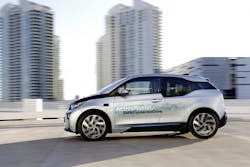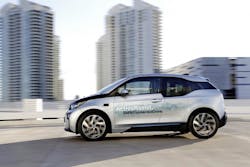What will drivers do when vehicles operate themselves?
As I noted back in January, the college polled 1,000 people in the U.S. between the ages of 18 and 70 to figure out the “consumer perspective” regarding self-driving cars – vehicles defined for the survey participants as a vehicle equipped with sensors and computing technology that would allow it to safely travel without a driver controlling the steering wheel, gas and brake pedal.
OK, so if AVs are given the green light to operate on U.S. roads – a VERY big if, mind you – and if consumers decide to buy them, what exactly might be going on behind the wheel when cars are driving themselves?
Well Carnegie Mellon’s researchers posed just that question in their poll and the top 10 responses might surprise you:
- Use mobile devices
- Eat lunch
- Read a book
- Watch movies
- Do work
- Pay bills
- Play video games
- Put on makeup
- Plan a trip
- Shoot and post photos or selfies
The survey also revealed that males (59%) and females (59.2%) were almost matched in their desire to use mobile devices and eat lunch, with 53.3% of men and 51.3% of women wanting to eat while on the road.
Yet more men (39.6%) than women (30.1%) opted to watch movies,
While a big “generation gap” seems to exist between Millennials and Baby Boomers, with those aged 18 to 35 in the poll wanting to use mobile devices and play video games much more so than older people.
Carnegie Mellon’s survey also dig up this interesting finding: some 71.8% of those polled want to remain connected digitally to their home. Here are some more factoids along that line:
- Desire for AVs to seamlessly connect to home systems: 71.8%
- Want AVs designed to be an office: 32.1%
- Outfitted as a mobile medical office and connected to medical systems: 22.6%
- Able to record journeys for a video diary: 21.1%
- Offers features to allow for “a great” mobile party: 12.8%
The school’s survey also found that those aged 25 to 45 and men (33.7%) more than women (30.5%) want their cars outfitted as an office. When it comes to having a car designed for a mobile party, not surprisingly, people 35 and younger signaled they would be “more receptive” to this feature than Baby Boomers.
Here are some other “generational differences” when it comes to AVs:
- People aged 18 to 24 ranked the highest in their proclivity to eat lunch and work in their cars.
- People under 35 opted the most (37%) to have their cars designed as an office.
- The desire to work in cars lessens sequentially with increasing age.
- Seniors aged 66 to 70 are most likely to read (51%), with those 18 to 24 are the second most likely to pick up a book.
- Respondents aged 25 to 35 are the most inclined to watch movies and put on makeup.
- Counterintuitively, while people routinely drink coffee on the go, only 8% of the people polled want coffee makers in their cars, and those most in favor of in-car java were 35 and under.
[Impertinent editorial interjection! I want TWO coffee makers in MY car and I am most definitely NOT under the age of 35. So there!]
Finally, what kinds of technology – aside from the “self-driving” systems, of course – do consumers want AVs to possess? Again, Carnegie Mellon’s survey dug up some surprising findings:
- Self-adjusting performance based on weather conditions
- Self-parking to find a space
- Driver fatigue warning
- TV or computer in the dashboard
- Active visual display of car safety features
- Virtual valet to avoid the rain (i.e.: the car picks you up)
- Voice command for the visually impaired
Here again a generational divide develops. Although “self-adjusting performance based on weather conditions” proved the overall top response, it ranked higher with people aged 36 to 70.
The youngest respondents (18 to 24) and the oldest (66 to 70) at 64% were closely matched in wanting cars that can find elusive parking spots. When it comes to fancying a TV or computer in the dashboard, virtual valet and an active visual display of car safety features, 18 to 24 year olds want these options much more than other age groups, according to Carnegie Mellon’s researchers.
Interesting stuff, indeed, but let’s see how much of it actually ends up in AVs down the road.

